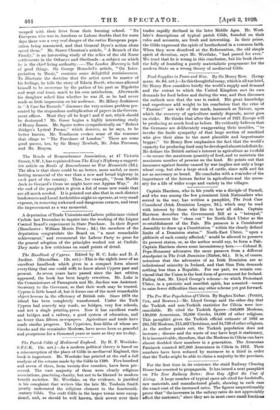The Parish Gikls of Mediaeval England. By H. F. Westlake.
S.P.C.K. 15s. net.)—As a modern political theory is based on a misconception of the place of Gilds in mediaeval England, this book is important. Mr. Westlake has printed at the end a full analysis of the returns made by the Gilds in 1389. Five hundred and seven of these, from twenty-five counties, have been pre- served. The vast majority of them were clearly religious associations, practising charity, but not to be likened to modern benefit societies. Mr. Westlake, on the evidence, is justified in his complaint that writers like the late Mr. Toulmin Smith greatly underrated the religious element in the fourteenth- 3entury Gilds. The craft Gilds in the larger towns were excep- tional. and, as should be well known, their power over their trades rapidly declined in the later Middle Ages. Mr. West. lake's descriptions of typical parish Gilds, founded on theis rules and accounts, are fresh and interesting. In their prime, the Gilds expressed the spirit of brotherhood in a common faith. When they were dissolved at the Reformation, the old simple spirit of devotion, says Mr. Westlake, "had passed for ever." We trust that he is wrong in this conclusion, but his book shows the folly of founding a purely materialistic programme for the modern State on a wrong theory of mediaeval Gilds.


































 Previous page
Previous page